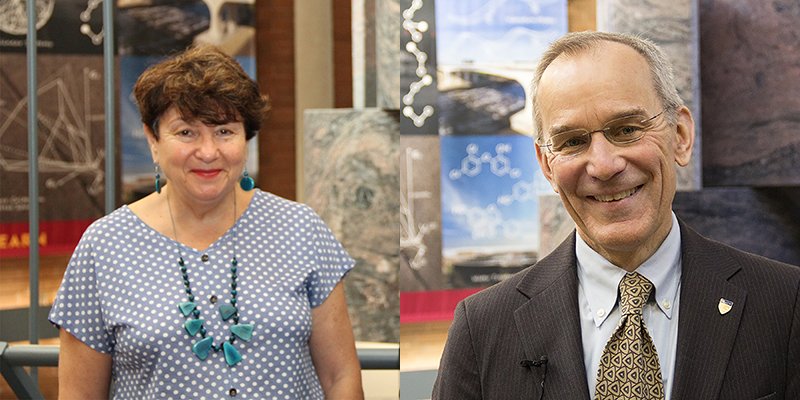International Opportunity for Graduate Students
A: An international consortium of four institutes and six universities.
Sofia Mogilevskaya and Joe Labuz are part of DIAGONAL, a consortium funded by the European Commission, whose goal is to extend the use of brittle and ductile functionally graded materials in the transportation and security industries.
New manufactured materials have expanded the types and characteristics of composite materials available. One class of new materials, called functionally graded materials, can be designed to display specific properties, and those properties can change in various directions. Functionally graded materials are manufactured composite materials that can be adapted by varying components within the materials. Researchers are still working to predict how these new materials will respond and last in various applications. Of critical importance is knowing the stress and fatigue response of materials when building infrastructure.
The European Commission has funded an international consortium, “Diagonal,” to advance the state of the art in flow and fracture of brittle and ductile functionally graded materials. The consortium will engage in training and knowledge-sharing activities, and in a series of international workshops for doctoral candidates and postdoctoral researchers from participating institutions and universities. The scientific objective is to extend the use of functionally graded materials for critical structural applications in the transportation and security industries. Their interests include fabrication of parts with additive manufacturing techniques, commonly known as 3D printing.
Project Diagonal brings together four European institutions, the University Carlos III of Madrid, Spain; University of Seville, Spain; Institute of Fundamental Technological Research, Poland; and the School for Advanced Studies Lucca, Italy, plus six partner universities (University of Florida, USA; Northwestern University, USA; Texas A&M University, USA; University of Minnesota, USA; Monash University, Australia; and Universidade Federal de Santa Maria, Brazil). The University of Minnesota is represented by Sonia Mogilevskaya and Joseph Labuz, both from the geomechanics group in CEGE.
As part of DIAGONAL, Sofia (Sonia) Mogilevskaya, a Research Professor in CEGE, will spend ten days at the University of Seville, Spain, in November 2023. Mogilevskaya will train doctoral students about the homogenization of composite materials.
In July and August 2024, Professor Mantic from the University of Seville will come to Minnesota to conduct research with Mogilevskaya and Professor Joseph Labuz on modeling thin and functionally graded layers. Mantic will also present to and interact with CEGE graduate students during his visit.
This consortium builds on the complementarities of the participants. Several participants have published papers on the characterization and modelling of the mechanical behavior and failure of porous metallic materials subjected to a wide range of loading paths and rates (University Carlos III of Madrid, Institute of Fundamental Technological Research- Poland, Texas A&M University, University of Florida and Universidade Federal de Santa Maria, Brazil). Others have developed experimental, theoretical, and computational procedures to identify model fracture in various engineering systems (University of Seville, Spain; IMT School for Advanced Studies Lucca, Italy; University of Minnesota Twin Cities, USA; Northwestern University, USA; and Monash University, Australia). The investigations encompass fracture response in functionally graded materials and in alternative engineering systems with various materials, such as polymeric materials, carbon-fiber-reinforced polymers.
Understanding the behavior of new materials is critical for the safety of infrastructure around the globe.
The DIAGONAL project has received funding under the European Union’s Horizon 2020 research & Innovation program under grant agreement No. 953152. DIAGONAL is an EU-funded Horizon 2020 project addressing the call topic “Safe by design, from science to regulation: multi-component nanomaterials” (NMBP-16, see EC information). This call funded two other projects related to safe and sustainable multicomponent nanomaterials. The sister projects are HARMLESS (“Advanced High Aspect Ratio and Multicomponent materials: towards comprehensive intelLigent tEsting and Safe-by-design Strategies,” GA no. 953183) and SUNSHINE (“Safe and sUstainable by desigN Strategies for HIgh performance multi-component NanomatErials,” GA no. 952924).
